Scenes from a Gender 05: The Prehatching Years


1. Maybe you can relate: I absolutely loathed gym class in seventh grade. My bony frame, skinny arms, chicken legs—let’s not even talk about ‘shirts vs. skins’—but maybe worst of all, the sanctioned sense of hierarchy and competition. But there were only so many times I could claim to have a stomachache. So most of the time I had no choice but to participate in the dreaded ritual. One Thursday, Mr. Popovich introduced us to ‘European Handball’, which was like soccer, in that you scored goals by getting a ball into the back of a net, except that you passed the ball with your hands. (“What fresh hell is this?” I didn’t think to myself.) Anyway, as usual, five ‘captains’ were nominated—these were inevitably the tallest, strongest, most athletic and popular boys of our class. And yes, they were always boys. In turn, they would pick their teams, starting with the next most athletic boys, and so on, until they got to the least physical boys. At the end of this lottery, it was usually just the girls left…and me. So Mr. Popovich got it into his head that the rest of us should form a sixth team, and we did.
Something struck me that afternoon and I got pretty het up, angry about this system that reinforced a sense of validation according to physical prowess, power, and gender. And I guess that anger translated itself into a small superpower because: in the first game I scored two goals (I imagine little me hurling the ball at the goal, teeth bared, skinny limbs flailing), and we beat the first boys’ team. In the second game, I scored another goal and we were off to the finals, against all odds. The girls’ team didn’t win the final round, but sister, we gave the boys’ teams a little demonstration of femme power, yes we did. After this idiotic tournament, Mr. Popovich was impressed enough that he came up to me, lifted me up from my cross-legged seat on the floor by one skinny caramel-colored arm and said something about how I had showed a lot of heart and spirit and that was what P.E. was all about. (53-year-old me calls bullshit on that, Mr. Popovich, and would have wanted you to dismantle the systems that made P.E. the hellscape that it was.) I was mortified, to be sure, but also honored and validated, to be on the girls’ team. And oh yes, honey—I’ve never left.

2. I’m home in Manhattan during fall break from college. I’m heading downtown to meet friends for an early drink at Holiday bar, tatty seats, grumpy bartender and all. I should have just walked there but instead I’m waiting for the M15 bus on 2nd avenue and 23rd street. I’m leaning up against the façade of a deli, thinking that the closest thing they have to a ‘premium’ beer at Holiday is…Rolling Rock. An older fella, a small man with a cap and cane, sidles up to me, a little too close. After a minute he asks: “How much?” I’m a little flummoxed but, thinking he means “How much is the bus fare?” I answer: “It’s…it’s a dollar fifty.” His eyes light up but now it’s his turn to be flummoxed—he says nothing but proceeds to shuffle away, clearly distraught. It’s only later, on the bus, while I’m mulling over this weird interaction, that it dawns on me what his enquiry actually entailed.

3. The architecture school I attended hosted the best Hallowe’en party on campus. Everyone put in extra effort into their costumes and the atmosphere was heady, glamorous, decadent. For me, it was a chance to indulge: I would go over to the vintage clothing store in Porter Square (next to the witchcraft store, natch) and pick out a cheap, frilly pink or lavender wedding/prom dress, organza ruffles, spaghetti straps, you girls know the deal. I’d dyed my hair a very tasteful fuschia (or was it cyclamen?) that year and arranged my tresses into a messy updo. I wore long white gloves like I was a Southern debutante. I’m not sure if this was the first time I’d played dress-up since it was Hallowe’en, it seemed like it was the one night when such things were ‘allowed’, that wearing such clothes didn’t seem transgressive.
I had a lively time that night. Michele (the Swiss exchange student, who also loved The Primitives and Tintin, and rode a Vespa back in Zurich) had, along with two other girls, had got dolled up and looked like Rococo courtesans, with elaborate Marie Antoinette-style wigs and poufy floor-length gowns—we’d been sharing cigarettes recently after lectures and at parties and were becoming friends quite quickly, but that night, she kissed me. It was my first kiss with a girl, as a girl. I was a little giddy, to say the least. Later that night when I had to pee, I headed to the men’s room (ridiculous, I know) where my transgression reared up: the boys there all turned from their urinals and informed me, angrily, that I was in the wrong bathroom and told me to get out. I think I explained that, um, it was Hallowe’en and that I was in costume, and that I just wanted to pee in peace, for goddess’ sake. A night of firsts. Michele went off to another party but I was too tired to join her. I couldn’t ride my bike home owing to my voluminous frock so I legged it—my pumps were not made for walking, so I took them off at some point and ambled through the streets of Cambridge barefoot, equal parts drunk, melancholy and elated.

4. Joan and I are upstate, on the way up to her mom’s place in the Adirondacks, when we make a stop in Saratoga Springs to meet mom and her new boyfriend, Bob, for lunch. He’s meeting us at The Olde Bryan Inn, which sounds like it’s right up my alley. He’s been sitting at a table before we arrive, but he comes out to meet us in the parking lot when we drive up and ushers us inside. They have Schöfferhofer on tap, which for some reason seems very exotic to me (I was still in my 40s, whaddaya want.) The waitress comes over to our table with menus and makes idle chit-chat with Bob, who she seems to know well. As she takes our drinks orders, and starts heading back to the bar, she says: “Well, I was worried about ya Bob, sittin’ there by yourself earlier on, but here you are now, surrounded by three lovely ladies!”
Joan turns to me and smiles—I’m chuckling to myself. Joan’s mom and Bob are confused but say nothing. Maybe this was the first signpost on the right path.
Scenes from a Gender 04: Stories of Trans Love

These scenes are written submissions from our staff and Autostraddle readers, illustrated by trans artist Bishakh Som. You can read more Scenes from a Gender here.
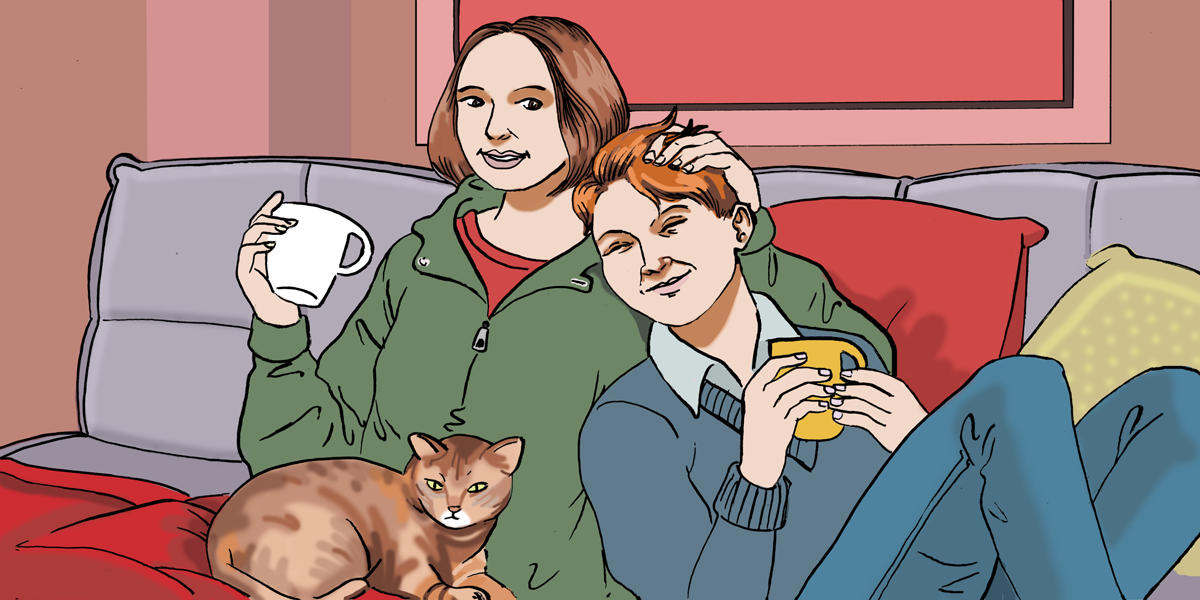
Submission from reader Felix Grego.
My name is Felix. My wife’s name is Leo. We met through mutual friends before the pandemic. By May 2020, everything felt uncertain except our love. Leo was working with the public, but with no health care. I work for a company that pays for my health care. We decided to get married that month to share my benefits.
The local county clerk’s office offered exceptions to help keep weddings small—the wedding just needed one adult to officiate and two witnesses. My queer neighbor officiated, and our two friends witnessed. The ceremony took place in our apartment building’s parking lot. We now felt ready for anything, including my upcoming top surgery.
After months of delays, I was finally getting the mastectomy I had dreamed about for years. Leo and I were nervous about the added stress of her taking care of me on top of working with the public in a pandemic. We found that the setting created tender moments. Soft touches, loving looks, and the feeling of safety around each other sparked an even deeper love.
I’ve since healed from my surgery and now pounce on any opportunity to take care of her.
I thought I would be unlovable if I transitioned. I thought that I wouldn’t be able to fit in with lesbians. I thought I wouldn’t be attractive to anyone. I tried to convince myself that I was unlovable.
But this experience has taught me that everyone is worthy of love.
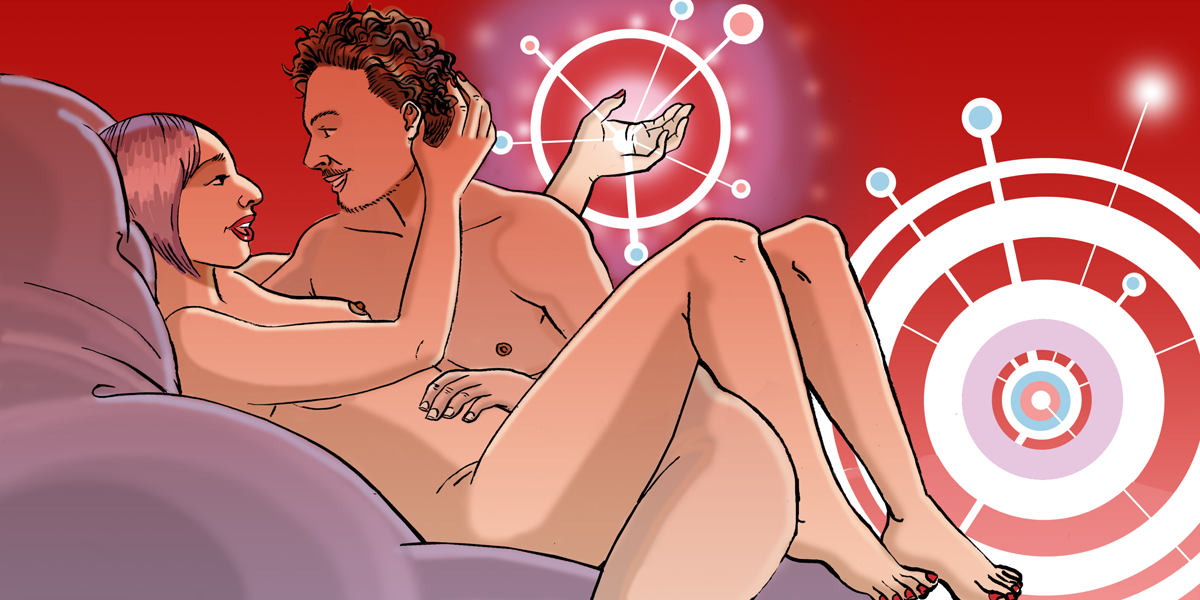
Submission from reader Lana Pham.
I met Niko on Grindr. I had gone out with and spoken to other trans guys before, but had never been intimate with any until him. Many I knew or had encountered were either stuck in toxic masculinity or simply incompatible with me. I’m a slight narcissist, so I prefer guys similar to me — quiet, soft, playful, and mischievous. Niko met those requirements, and he was beautiful too.
I wasn’t nervous my first time with Niko and just hoped my cis-dick sucking skills translated well. In the dim light of my room, I could feel his packer underneath rough denim. I was lost in his soft kisses.
He suddenly undressed before me. And when I reached down again, his packer was gone. My hand instead met his wet excitement. After briefly rubbing each other, Niko directed his attention to my breasts with his mouth. He was gentle but firm, then slowly trailed his way down to taste more of me. He enveloped me fully, and I grew harder with every movement. I didn’t want him to stop, but I was excited to return the favor. After fumbling on my own, I directed Niko to sit on my face and take control. He forced my tongue between his lips. When he was finished, the makeup around my mouth had smeared off. I was erect, and he pulled me over to lie on top of him. I felt the full heat of his body as we continued kissing. With a simple shift, I slipped inside him.
I felt tense for a moment, but focused on the pleasure of our bodies instead. Internalized transphobia conditioned me to associate Niko’s parts with femininity, and after sex, I was left to ponder the hypocrisy in that. I was a trans woman who had spent years searching for self-love and sexual enjoyment despite the limitations of a cisgender world. I had allowed myself to remain confined instead of looking beyond what I had been taught. With Niko, I was experiencing my body without any scripts leading me. Enjoying each other’s bodies was the only guide. With most cis men, I have to align myself with cis women to accommodate their understanding of me. My efforts in doing so end up getting in the way of my own satisfaction. I didn’t have to perform with Niko. My body could just be. He was still masculine, and I was still feminine, regardless of what our bodies were doing. Niko widened my imagination to the possibilities of sexual intimacy. And unexpectedly, I was a little more healed.
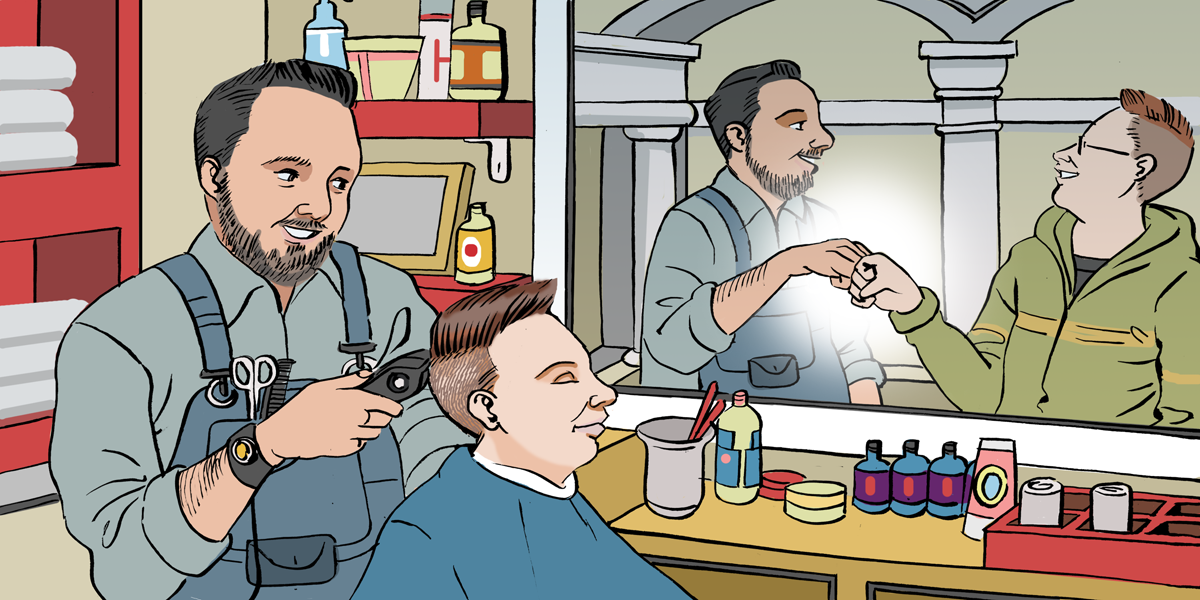
Anonymous submission.
He told me that he decided to become a barber when he got kicked out of a barbershop at a young age. The shop wouldn’t serve someone they saw as a girl or queer. After that, he knew he wanted to make a safe space for trans and queer people. He’s about 20 years older than me, so he’s as much a mentor as he is a friend. Even after all the years of transphobia and marginalization he’s experienced, he wears his identity with pride and lifts other trans people up too.
I feel so much safer in his chair than with the cis guy I used to go to. He has never made me feel bad about being anxious around being touched. (I get a little shaky sometimes.) I know I can trust him enough to relax. He approaches me with sincere care and warmth, and an almost paternal sense of affection. He always makes sure to tuck an extra towel into the back of my shirt so the little hairs don’t get into my binder, because he knows from experience that it’ll drive a person crazy. He fist bumps me sometimes which is silly but also somehow very validating? I couldn’t explain why, but it’s good stuff. He always uses my pronouns right and compliments me with masculine terms, which no one else ever does. I leave the shop with the biggest grin on my face, and it sticks for hours.
The conversation flows so easily. I appreciate having someone who just gets it and let’s me gripe about getting deadnamed at the doctor’s office, or chased out of a public restroom. He’s someone who will celebrate the progress of my transition with me. The solidarity is life-saving. It’s wild because the town I live in is pretty traditional and conservative, and somehow I’ve managed to find this amazing little refuge.
It’s so rare that I feel completely understood and valued, and I feel like only another trans person is truly capable of that.
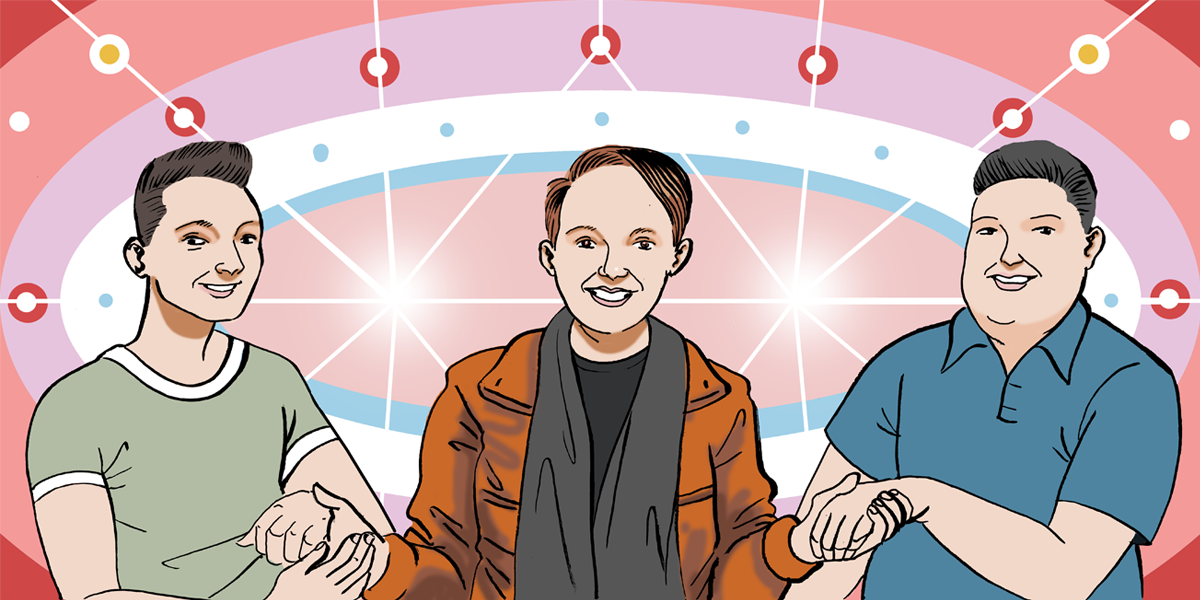
Submission from contributor Adrian White.
When the three of us are together, the air fills with magic. Wynn, Lysi and I are all non-binary, but we relate to our genders in very different ways. These differences are part of what made it possible for us to love each other so well through our transitions—a name change for me, HRT for Lysi, difficulty coming out at work for Wynn, pronouns and top surgery for all of us. We asked each other good questions, gave each other needed time and space, and gently pushed each other when we were scared.
Our trans love story is one of friendship, partnership, and family. Wynn and I are married, and Lysi is very much our chosen fam. The three of us feel like our own little organism, and each pair has its own independent dynamic, too. Though Wynn and I moved to Nashville from Dallas, we still find ways to be present for each other and continue to support each other through the lifelong journey of transition. Because of them, no matter what happens in this transphobic world, I can keep trans joy at the center.
A few months into the pandemic, Lysi drove through Nashville to visit family in Ohio, as their grandfather was in failing health. It had been months since I had looked forward to anything, and hugging them in the parking lot, masks covering our smiles, felt like coming home. We went to the patio area in our apartment complex and Wynn grilled bratwursts and vegetables. There was an ease of being together, in a time when absolutely nothing felt easy. Wynn and I have good friends in Nashville, but it’s different to spend time in physical space with someone who truly knows you. We covered a lot of conversational territory, but I couldn’t tell you specifics. I just remember feeling settled in my body and a deep sense of the way the three of us belong to each other and the joy of sharing a meal with another human being in the sunshine. As the pandemic continually draws me toward despair, I remember that evening and know that soon enough we’ll be together again.
Support Independent Queer Media
We’re raising funds to make it through the end of July. 99% of the people who read this site don’t support. Will you be one of the ones who do? Joining A+ is one of the best ways to support Autostraddle — plus you get access to bonus content while keeping the site 99% free for everyone. Will you join today?
Scenes from a Gender 03: Trans Resilience Throughout 2020

These scenes are written submissions from our staff and Autostraddle readers, illustrated by trans artist Bishakh Som. You can read more Scenes from a Gender here.
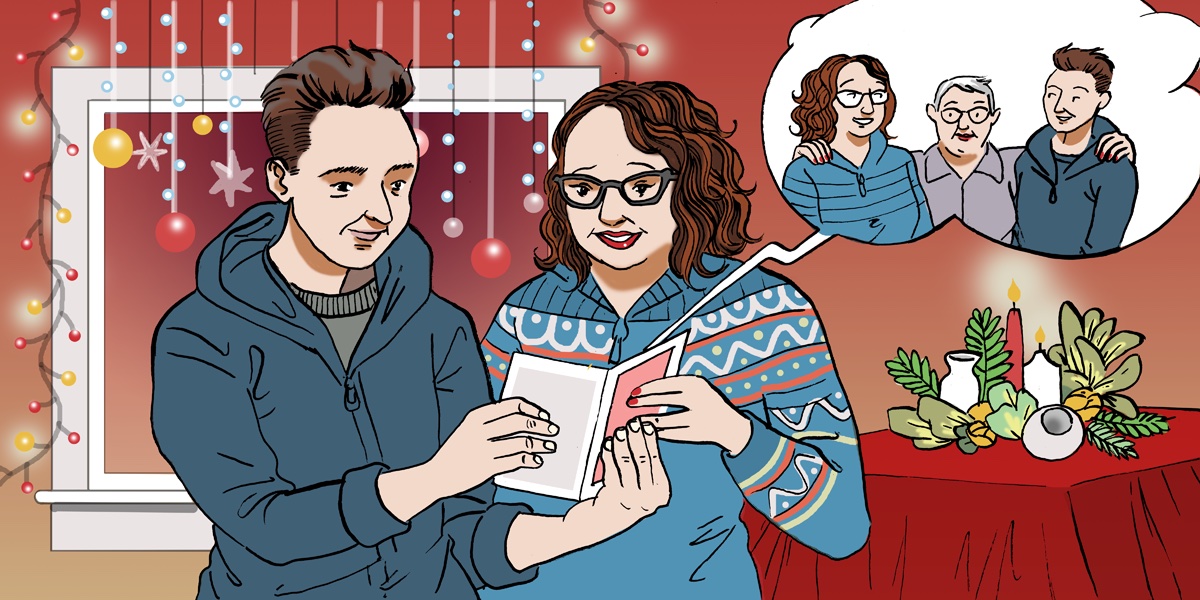
Submission from reader Alex Danvers.
This year, I came out as nonbinary to my in-laws and it’s been a bit of a bumpy ride, particularly regarding my mother-in-law.
When I was trying to explain my change of name, my mother-in-law gave ‘helpful’ suggestions like “why not just use your initials, then you don’t have to tell people” and “people just won’t understand” and “you can’t explain it to people like [my wife’s uncle]”.
Cut to a few months later when Christmas cards started arriving in the mail. They were addressed to me, in my name. Not my deadname. The first was from my mother-in-law, the others were from all of the extended family members that she had told.

Submission from reader Asher Firestone.
I’ve had a really interesting journey of reciprocal top surgery healing with my friend, Hands. They’re a body worker, and a couple days before my surgery in September, they gave me this energy massage in the backyard of a house they were catsitting at. They imbued a rosemary-oiled release into my old chest, and then we sat in a hot tub musing about their dreams of a flat chest.
I ended up having a pretty rough recovery period, and they helped me film a short movie about it so that other trans folks would feel more comfortable talking about the pain of this process. They ended up staying with me for three more weeks than expected — to massage me, cook for me, watch reruns of Sister, Sister with me. The next month, they moved in with a friend two houses down from mine, and we began making calls to their insurance as I slowly gained the strength to chop my own veggies and reach for the shampoo.
Now, they’ve asked me to be their primary caretaker for their top surgery in February. It feels so cosmic to be able to give that love and nurturing right back to them. All our queer friends on the street will chip in lasagnas and gentle walks, just like they did during my healing a few months ago. Building a trans community happens in both these small and profound moments of connection, and the two of us are thrilled to frolic around the Hudson Valley this spring in our tiny tops and big grins.
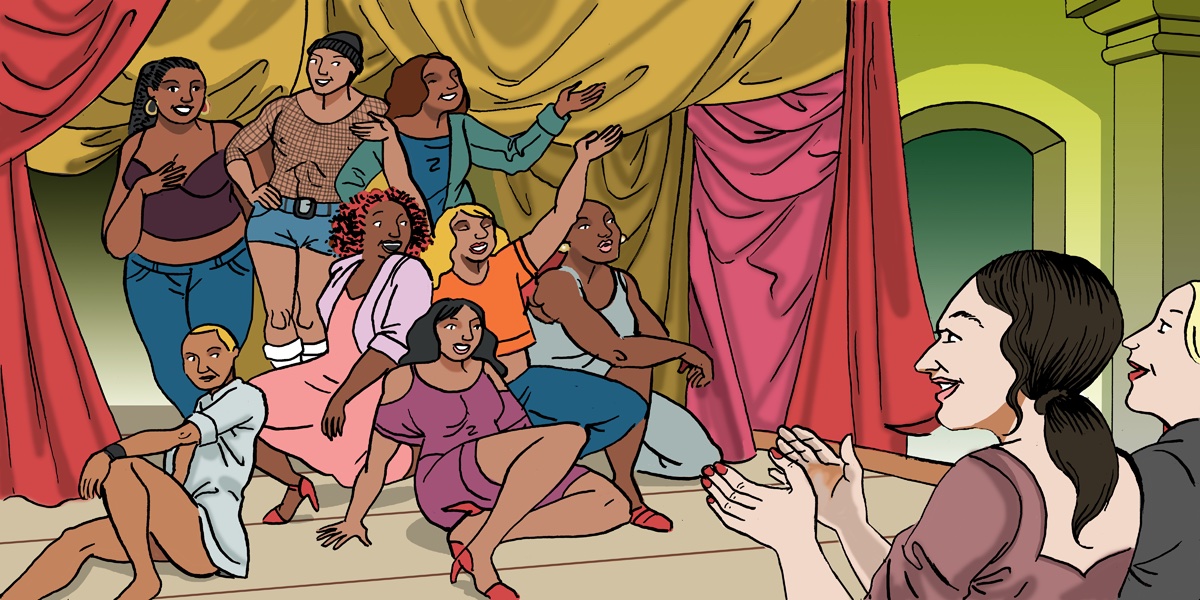
Submission from Autostraddle writer Drew Gregory.
Like many people, when I was first coming out, I felt insecure about the identity I was fighting so hard to claim. I felt outside the community that I was losing so much to join. I now know there’s no right way to be trans, but when you’re raised in a cis-centric world it’s hard to feel comfortable in a trans identity, especially your own.
Around this time I went to see the trans play of the New York theatre season. It was well-reviewed and buzzed about and I didn’t relate to it at all. I spiraled. Maybe I wasn’t really trans. Maybe this was all fake. My therapist had recommended spaces for me to meet other trans women and those spaces had felt equally alienating. Why wasn’t I fitting into those spaces? Why did I bristle at the conversations of these fellow new trans girls? Why didn’t I connect with this play about trans people — about me?
A week later, my girlfriend and I went to a reading of Wig Out! by Tarell Alvin McCraney. Her friend had helped organize a weekend-long event called Interfest billed as “a free arts and ideas festival for liberationists to radically engage, boldly express, and joyously unify as a community.” I didn’t know the reading had a trans actor or several genderqueer characters or really anything about it except that McCraney co-wrote Moonlight. I didn’t go in looking for connection or validation. But I found it.
As a white trans woman, theoretically the “trans play” should’ve been more relatable than McCraney’s Black queer play about ballroom. But the messiness of the show’s approach to gender and performance and community connected with me so much more. This play, and specifically this community-focused low-budget reading of this play, helped me realize that my idea of transness had been limited by an assimilationist mindset. I’d left one box only to try and fit into another — that’s why it felt wrong.
Transness and trans community will always be about expansion to me. I want to revel in our differences — our different experiences, our different perspectives, our different desires. There’s nothing wrong with fitting a conventional trans narrative, but I learned that day there are other options. There are so many more narratives we can create.
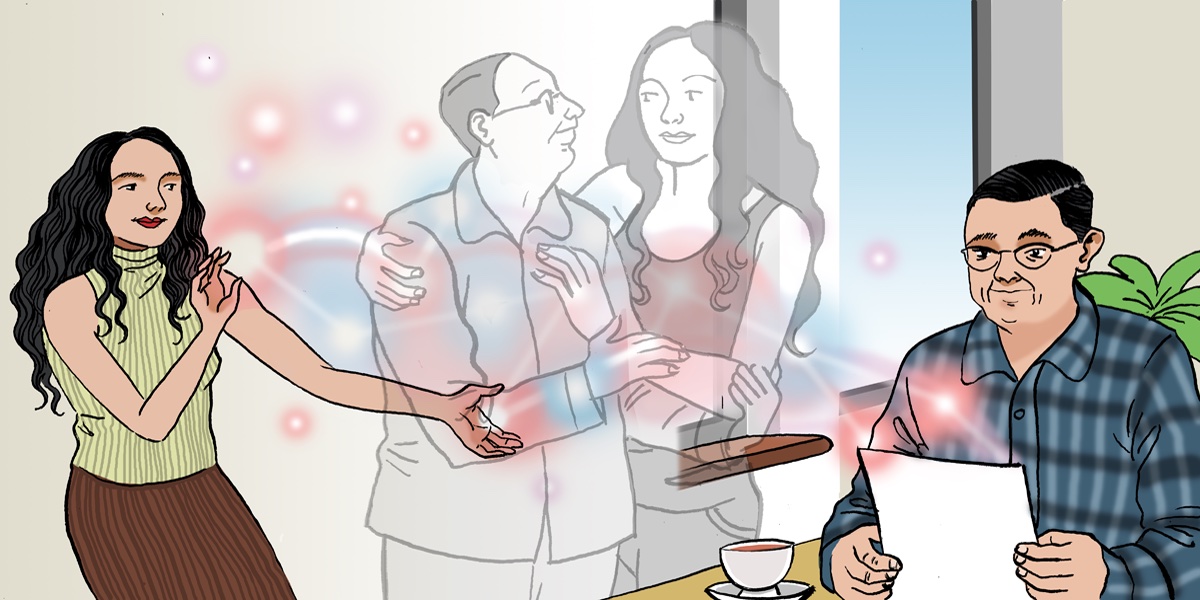
Submission from trans subject editor Xoai Pham.
This year, the holidays were different because my father came down with COVID-19. For much of my life, my dad has been the silent protector. And in this case, he was in a state where he needed protection himself. He was bedridden for weeks.
On a day where his symptoms were particularly bad, we decided to take him to the hospital. There was a moment when the nurse wheeled him away: I had a chance to ask her for a private moment with him but I shrunk in fear. I couldn’t face him alone while he was hurting.
As he recovered at home, I realized that there was so much I wanted to say to him. How proud I was of how he did as a father. How sorry I was for all the times I was unkind. And how I wanted him to forgive himself for all the ways he is hard on himself. So I wrote him a letter almost every day. The combination of physical and emotional support was important to motivate him to get out of bed so his body could get stronger. I asked him how he felt about the letters after he had regained his health, and he told me he cried. That was enough for me to understand.
My relationship to my father is an example of trans resilience. We often talk about trans resilience as the trials that trans people survive. Our resilience is also the ways that we contribute to the resilience of our communities. Our resilience is reflected in the depth of the bonds among us. In a world that creates circumstances of violence that tears trans people from our families, this holiday season was trans resilience. Not because I survived — but because my father did.
Scenes from a Gender 02: Illustrated Moments of Trans Womanhood


1. I’m in Manhattan after a meeting with my publisher. It’s a warm autumn day and I’m wearing a salwar kameez and dupatta. My hair is plaited into a single braid which I wear over my right shoulder. I’m not eager to leg it right back to Brooklyn, so I prolong my stay on the island a bit. I walk down to “Curry Hill” to stock up on some South Asian groceries. I go into my favorite shop, Foods of India, and I’m momentarily wary on entering, remembering how my clothes are strongly signifying my ethnicity and how my hair and kohl are strongly signifying my gender. And how both aspects are amplifying each other in a space like this. And though I have been lately navigating urban spaces with little-to-no hassle or bother, I still have to check myself on occasion. The owner, a Sikh man sits at the counter — I’m pretty sure he recognizes me. I say “Sat Sri Akaal” to him and he responds in kind. I’m thinking everything will be fine. I pile up my shopping basket with bitter melons, garlic pickle, pointed gourds, cumin seeds, red lentils. I make my way to the counter where the owner has been joined by another colleague. As I’m unloading my items from my basket, I notice that the owner is looking at me with some interest.
“Oh shit,” I think, “he’s clocked me.” I try not to look at him but I know he and his pal are pretty intrigued. “Here comes the shitty questions.” Sure enough, as he’s ringing me up he says: “You…you are…” I brace myself for it. “You are…Pakistani?” I look up at him, wide-eyed. “Me? Pakistani? Uh, no…no, I’m Bengali.” Sardar ji is incredulous. “Bengali?!” he exclaims. “You look like you are Pakistani!” His colleague agrees with him. “Hah! Bengali!” I’m not sure how to respond, so I say “Bahut shukriya” — thank you — for the groceries and I amble out of the shop, quite relieved.

2. A rainy afternoon in Park Slope: I’m walking to the bank to deposit a check because I am an old-fashioned girl. Maybe I’ll buy an eggplant on the way back, I’m thinking to myself as I stroll down 9th street under my cheap umbrella. By now it’s more than drizzling and has become a little heavy. Suddenly from behind me, someone tucks themself in, right under my brolly. “Excuse me,” she says, “do you mind to share your umbrella?” She’s quite small, South Asian, wearing a kurta, her hair in a plait. I’m a little taken aback, but not unpleasantly so. “No problem.” I say.
We walk a little ways in silence but soon she asks: “You are married?” I’m on my guard but I don’t have to dissemble, so I tell her I am. “How many children?” she inquires. Oh no, I think…but whatever. “Uh…we don’t have any children.” I reply. “No children?” she is incredulous. “Why no children? Your husband doesn’t want children?” I don’t think I’m grimacing, but I could be wrong. “Uh, no…we’re, uh…not ready for that…” I’m babbling. “My husband!”
I think to myself: Oh thank goddess, we’ve arrived at the bank.
“Um, I have to go in here…” I tell her. “Oh, ok. I walk to the bus stop,” she says. “Wait,” I tell her, “you don’t have an umbrella? Please, you take mine.” She smiles at me. “You are sure?” I smile back. “Of course, please take it, sister.” She takes it, thanks me, and makes her way off towards 4th avenue. I am filled with the heavy cream of sisterly kindness.

3. We’re in India. It’s Joan’s first time ever and I haven’t been here in 10 years, since my parents died. We’re in Kolkata, where my parents grew up, where they had a flat and where they used to take me every two years during childhood summers to spend a month and a half with aunts, uncles, cousins. So here I am, playing tourist for a change. I am not sure how I will be read here, in terms of gender. But it is, for someone who has never lived in India, terra incognita to some degree — and I’m thinking I need to play it safe, which means wearing clothes that are as gender-neutral as possible. I wear my hair in a bun and am trying not to draw attention to myself. I need not have worried too much though. I’m read as who I am, a woman, pretty much everywhere, which pleases me no end. People, mainly dudes, are staring to be sure – but who knows what they are thinking. Anyway. We’re walking towards the Victoria Memorial, the sun is shining and the grass is lush. As we approach the gates, I notice a trio of trans women milling about the entrance, talking amongst themselves. I had been wondering if I’d get to meet any Indian trans ladies and here they are, in a thoroughly unplanned situation. As we approach them, I catch their eye — they see me but don’t seem to take much notice until I salute them, hands together, and say “Namashkar.” They turn towards me. I say to them, in Bengali: “I’m like you!” It’s pretty clumsy, but I lack the vocabulary to put it in a more eloquent way. They see me. They light up and speak to me in rapid-fire Bengali, asking me where I’m from, what I’m doing in Kolkata, telling me I have to come with them to a puja — a Hindu ritual of worship — and I respond, in my utterly pedestrian Bengali, that I can’t (I’m still a little wary) but I thank them with a namaste and we head inside the gates. I’m a little giddy, and in retrospect, a little rueful that I didn’t go off with them, maybe even to become the fourth member of their little trans gang.

4. Joan and I are spending a weekend in Saratoga, NY. Her mother is performing in a dramatic production up there. Joan says that as long as we are in the area, we should go visit her stepmother in Schenectady since it’s quite close. It’s 2015. I have been questioning my gender for a little while but am not really sure where I am. I have been using gender-neutral pronouns but am still a little cloudy as to who I am, where I belong. Not at all certain how I even characterize myself. Joan’s stepmom has probably told her adopted 11-year-old twins that Joan and her “husband” are coming to visit, which at this point, is not something I’m willing to dispute. We arrive at the house and Joan’s stepmom introduces Joan to one of the twins — the other one is having a time-out as she has attempted to bite her sister. Before she can introduce me, the child, looking past me, says: “Where’s Bishakh?” Joan and I side-eye each other. “I’m…I’m right here. I’m Bishakh,” I say. The child is thoroughly perplexed. “Huh.” She’s not satisfied. “I was expecting a boy.” Wow, I think to myself. This is a moment.
Stepmom is trying to write off the whole thing somehow because I think she thinks I’m embarassed, which I’m not — just quietly surprised. But the child is still analyzing me. I imagine the gears revolving in her head. “I have a question!” she exclaims. Stepmom knows where this is going so she tries to head her off, but the child will not be dissuaded. “My question is,” — here it comes — “… are you transgender?” No one knows what to say, me included. No one has ever asked me that before, me included. Stepmom is making excuses for the child, saying they know a trans woman in the neighborhood and therefore, these kinds of questions. But my mind is made up. “Yes,” I say. “I am.” This is the first time I have acknowledged it to myself and I am finally recognizing a feeling that has been simmering for maybe ages now. “I am trans,” I say, definitively. “Oh, ok,” the child responds. She turns on her heels and heads for the kitchen, singing the name of the family cat in a sing-song manner.
Read the first edition of Scenes from a Gender by Bishakh Som.
Scenes from a Gender: Illustrated Moments of Trans Womanhood


I’m walking home from yoga. I’m wearing black cropped sweatpants, a My Bloody Valentine tank top, ballet flats. I have my hair up in a bun because it’s a hot summer day. As I approach my building, I pass a black SUV parked on our block. The driver exclaims: “Excuse me! Excuse me!”
“Yes?” I say.
“Ehm…eh…is this…is this Park Slope?”
“Yes, it is. What are you looking for?” He’s a Hasidic man, beard, 50ish, maybe 60.
“Ehm…I want to talk to someone…”
“Um, yes?”
“I want to talk to someone…about the gay.”
“Excuse me?”
“I want to know more about…the gay.”
I’m just too confused to do anything rational. “Well,” I say, stupidly, “I’m sure there are, um, online resources you could look into.”
He chooses to ignore this pearl of wisdom. “You live here?”
“Um, yeah.”
“In this building?”
At this point I should have just ran. “Uh huh.”
“Maybe I come upstairs and talk with you? You have time?”
“Uh, no…I don’t think so. Look, sorry, I’ve got to go.”
He stares at me quizzically. “You are a man or a woman?” Why am I still engaging with this person?
“I’m a woman.” I say.
“You have a penis?” he responds.
I turn around and stride purposefully home. I’m shaking.

Joan and I are in Berlin, looking for a bar to pop into for a pre-dinner beer or two. We choose a smoky old-school dive in Charlottenburg-Wilmersdorf. Everyone’s older, smoking cigarettes, playing cards, talking, laughing. Not a smartphone in sight. I clumsily try to order our beers in my nonexistent German — with the help of some friendly locals, we’re eventually sorted out. We sit in a corner next to some very drunk grannies who befriend us. They ask us how we like Berlin and we say we love it. They even write us a postcard, in German. At some point, an older woman with black hair and a chilly demeanor, sitting a table away, says to us: “I don’t know vhy zay are being so friendly viz you.” We don’t know how to respond. “Zhey are never zis friendly.” She looks at me. “Are you a man or a voman?” she asks. I’m, once again, dumbstruck. “A little bit of both, eh?” she says. Then she says something loudly in German. The whole bar falls silent for a moment. The drunk grannies start shouting back at her, defending us. Not sure what they’re saying, but they shut her up. We finish our beers and thank the grannies and make for the door. “What the fuck was all that about?” I ask Joan. Back in Brooklyn, our neighbor Ingrid translates the postcard for us. At the end it says “Berlin is not Germany. New York is not America.”

We’re in a Greek restaurant in the Slope — me, Joan, our friends Carrie and Amy. We’re finishing off our dinner — I’ve had the vegetarian moussaka with lemon potatoes washed down with some cheap Greek plonk. Across the way at another table is an older dude and a younger woman. I catch his eye and look away. I look back some minutes later and he’s still staring at me. The younger woman is going on in a loud voice about something annoying. I can’t help but look back though I know I shouldn’t. He’s still transfixed, or something. This time I hold his stare. He says to me: “You know, you’re a very intriguing woman.” Carrie hears this and is momentarily flummoxed. “I’m very attracted to you.” he says. Carrie starts giggling. The younger woman at the other table yells: “Daaaaaaaaad! SHUT UP!”

We’re on our roof. It’s a warm July evening. We’re drinking wine and my brother, visiting from London, is having his usual beer. Joan’s ordered a pizza for us for dinner. When they call to let us know they’re at our front door, I offer to go downstairs and get our pie. I trundle down the four and a half flights of stairs. I have on short-shorts, a cami, bare feet. At the door, the pizza delivery guy is a bald white dude, not sure how old really. “Yeah, I rang the bell but no one answered so I called your number.” he says.
“Oh, that’s good, because we were up on the roof so we wouldn’t have heard the buzzer.” I offer.
“On the roof, huh? Who’s up there?” he inquires.
“Oh, me, my brother, my partner.” Little miss innocent. So ready to share everything with the world.
“Your brother and your partner, huh? Well, what good does that do me?” I’m taken aback but once again, unable to disengage.
“I’m sorry?”
“You and your brother, maybe you and your partner?” What the fuck is he talking about?
“Hey, you want I should come back later?”
Now I’m back to my senses. “Uh, no thank you.” I counter. I sign the receipt and give him back his pen as I’m closing the front door.
“I can come up to your roof later.” he proposes.
“No, that’s really OK, thanks.” I just want this to be over.
Through the last sliver of open door, he looks at me and says: “OK, then. NAMASTE.”
Later, I tell Joan if we ever order from that pizza place again, that she’s in charge of greeting the pizza guy.